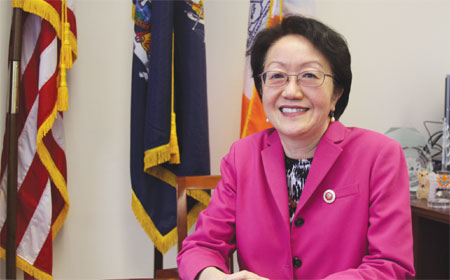Making community voices heard
Updated: 2014-06-06 11:50
By Amy He in New York(China Daily USA)
|
||||||||

|
New York City Council member Margaret Chin, representing District 1 in Lower Manhattan, at her office in City Hall, New York. Amy He / China Daily |
When New York City changed its charter in the 1990s to increase the size of its City Council to 51 seats from 35, Margaret Chin thought it was time for an Asian American to hold one of those seats, so she ran. And then she ran again and again.
It took her three times - in 1991, 1993, and 2001 - to finally represent District 1 in Lower Manhattan, which includes neighborhoods like Chinatown, around City Hall and in the Financial District, where she now lives with her husband.
"It was not easy, mainly because we just didn't have the numbers in our own community," Chin told China Daily. "A lot of Asians or Chinese living in Chinatown were not citizens, and even if they were citizens, they didn't register to vote."
Voter registration was low and there were obstacles even for those registered to vote. They encountered problems at the polling stations on Election Day: Chinese names were often entered incorrectly into the system and some Chinese voters were told they could not vote. Many had weak command of English and "didn't know how to be assertive" if given a hard time about it, Chin said, which contributed to the low voter turnout.
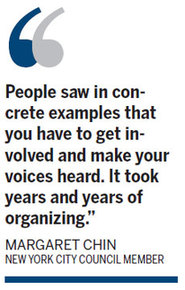
Chin immigrated to New York from Hong Kong in 1963, and she and her family lived on Mott Street, which at the time was still considered Little Italy - now is one of Chinatown's main streets - and most of her neighbors were Italian. In the last five decades since, Chinatown has gotten substantially bigger and has branched out to other Asian enclaves throughout the city, primarily in Brooklyn and Queens, and community participation has increased in the last two decades with more Asian Americans in elected offices.
"People saw in concrete examples that you have to get involved and make your voices heard. It took years and years of organizing. People are beginning to realize that to gain access to more government services, you have to make your voices heard," she said.
Chin worked as an educator at the LaGuardia Community College for 14 years, helping Chinatown immigrant adults get a college education. Now, she said, that outreach needs to focus on all ages within the Chinese community, beginning with young adults. Asians make up 10 percent of New York City's population of over 8 million, but there are only two Asian members on the City Council.
"If you work out the numbers proportionally, there should at least be five or six [Asian members]. But things don't work like that. So that's why it's important to educate the younger generation in terms of the importance of public service, community service so we get more people interested in government, interested in getting involved. That will help build the pool of people that will come into work in the government," she said.
At a time when the importance of the Asian-American vote is growing in national politics - the 2012 elections saw 547,000 new Asian-American voters, according to the nonpartisan organization Asian and Pacific Islander American Vote - New York City officials are also paying more attention to the Asian community, including hiring more Asian staff members, Chin said, who can hopefully be elected Asian officials down the road.
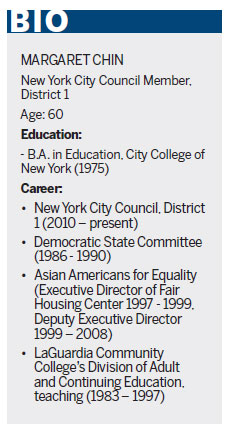
Manhattan's Chinatown has changed in many ways in the five decades since Chin came to the US. There's a lack of affordable housing and often multiple families can be found squeezed together in one apartment. Residents have benefited from subsidized housing and rent-controlled apartments, but the city has gotten more expensive and that's hurting many immigrant families in Chinatown, Chin said.
"Conditions have gotten worse in some ways, because now you have families living with other families in the same apartment," Chin said. "Fifty-one years ago, we were crowded in one apartment, but it was one family. But nowadays, we see so many cases of different families living together."
Chin sees the solution to many of Chinatown's problems as more education for adults and adults themselves making more time for education.
"How do you alleviate poverty? That's the issue I talked about, the importance of adult education and learning English so that they can take advantage of job training and take a better job," she said. "If you can raise your income, then more opportunities open up. You can find better housing, and the next generation will be better. When parents learn English, then they can help their kids do better in school too."
Chin sponsored legislation to expand the number of city employees who would be entitled to paid sick leave, requiring small businesses with five or more employees to pay sick time, down from the current requirement of 15 or more employees. The legislation was signed into law in March by New York Mayor Bill de Blasio, and went into effect on Apr 1.
"If we raise the income level, even with a minimum wage increase, that will help tremendously," she said. "Having paid sick leave, that means a lot to small businesses in Chinatown where normally, if you're sick, you take a day off and you don't get paid."
amyhe@chinadailyusa.com
(China Daily USA 06/06/2014 page11)

 Obama look-alike lands a movie role
Obama look-alike lands a movie role
 The world in photos: Sept 14-20
The world in photos: Sept 14-20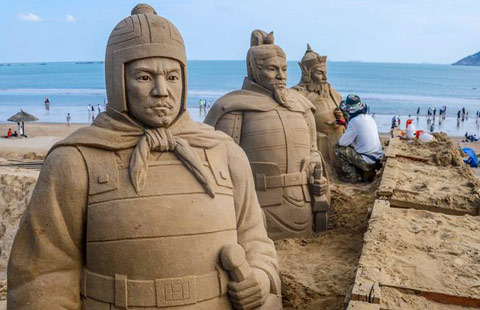
 Zhejiang's Zhoushan in full swing for sand sculpture festival
Zhejiang's Zhoushan in full swing for sand sculpture festival
 Stars arrive at the 67th Primetime Emmy Awards
Stars arrive at the 67th Primetime Emmy Awards
 Top 15 Chinese CEOs to attend US roundtable during Xi's visit
Top 15 Chinese CEOs to attend US roundtable during Xi's visit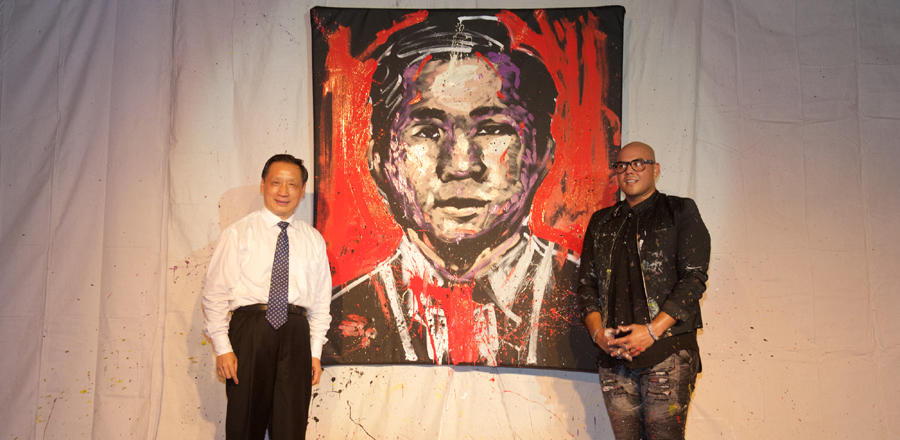
 Across America over the week (Sept 12-18)
Across America over the week (Sept 12-18)
 House showcasing Sino-American friendship open
House showcasing Sino-American friendship open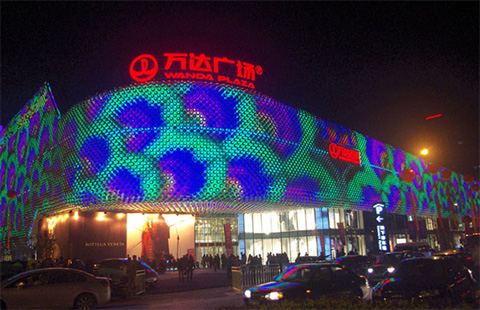
 Top 10 M&A deals between China and US in 2015
Top 10 M&A deals between China and US in 2015
Most Viewed
Editor's Picks

|

|

|

|

|

|
Today's Top News
Young people from US look forward to Xi's state visit: Survey
US to accept more refugees than planned
Li calls on State-owned firms to tap more global markets
Apple's iOS App Store suffers first major attack
Japan enacts new security laws to overturn postwar pacifism
Court catalogs schools' violent crimes
'Beauty of Beijing's alleys akin to a wise, old person'
China makes progress fighting domestic, international cyber crime
US Weekly

|

|
